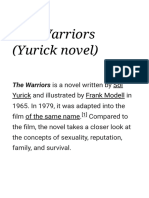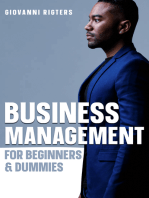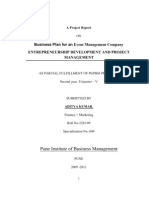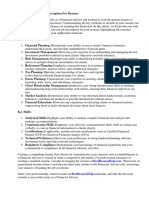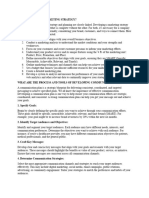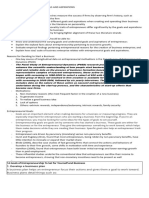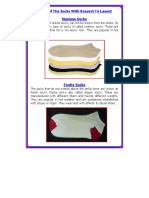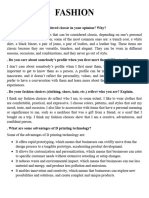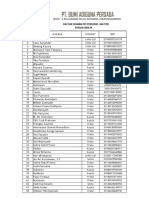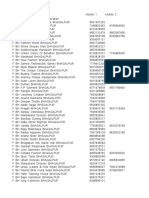Basics of a Business Plan
Basics of a Business Plan
Uploaded by
wennydelacruz28Copyright:
Available Formats
Basics of a Business Plan
Basics of a Business Plan
Uploaded by
wennydelacruz28Copyright
Available Formats
Share this document
Did you find this document useful?
Is this content inappropriate?
Copyright:
Available Formats
Basics of a Business Plan
Basics of a Business Plan
Uploaded by
wennydelacruz28Copyright:
Available Formats
BESTLINK COLLEGE OF THE PHILIPPNES – BULACAN INC.
Road 1, Minuyan Proper, City of San Jose Del Monte, Bulacan
THE BASICS OF A BUSINESS PLAN (FOR DUMMIES)
Starting a business can be exciting and challenging at the same time. The first step to success
is creating a solid business plan. In this chapter, we’ll break down the basics to make it simple,
even if you have zero experience.
What Is a Business Plan?
A business plan is a written document that describes your business’s goals and how you plan
to achieve them. Think of it as a roadmap that outlines:
❖ What your business is
❖ How it will operate
❖ Who your customers are
❖ How much money you need to start
❖ How you’ll make money
The goal is to use this document not only to guide your actions but also to present to potential
investors, banks, or partners. It tells them, “I have a plan, and here’s why you should trust me
with your money.”
Why Do You Need a Business Plan?
Here’s why a business plan is so important:
1. Clarifies your vision: Writing things down helps you solidify your business idea.
2. Attracts investors: A good business plan gives investors the confidence to fund your
business.
3. Guides your actions: It's a step-by-step guide to achieving your goals.
4. Tracks progress: You can measure your success by comparing actual results to your
plan.
Key Sections of a Business Plan
A business plan usually includes the following key sections:
1. Executive Summary
A brief overview of your entire plan. Though it's written last, it appears at the start of your plan
and should grab the reader’s attention.
2. Business Description
Explains what your business is all about, including your industry, structure, and what sets
you apart from the competition.
3. Market Analysis
An analysis of your target market, your competitors, and how you fit into the market. What
makes you different, and why will customers choose you?
4. Organization & Management
Details of your business structure, the roles of key team members, and who will run the
day-to-day operations.
Learning Activity Sheet
ECC10 – Business Plan Preparation
BESTLINK COLLEGE OF THE PHILIPPNES – BULACAN INC.
Road 1, Minuyan Proper, City of San Jose Del Monte, Bulacan
5. Products or Services
Describes what you’re selling or offering. What problems does it solve? How will you price it?
6. Marketing & Sales Strategy
How will you attract and retain customers? What marketing strategies will you use to promote
your product or service?
7. Funding Request
If you’re seeking funding, outline how much money you need, how you plan to use it, and your
proposed repayment schedule (if applicable).
8. Financial Projections
A look at the numbers. How much money do you expect to make? This section includes income
statements, balance sheets, and cash flow statements.
9. Appendix
Optional section for additional supporting information like resumes, permits, or product
images.
Tips for Writing Your Business Plan
Be Clear and Concise: Keep your language simple, avoiding jargon or complicated
language.
Do Your Research: Know your market and competitors well. It strengthens your plan.
Tailor It to Your Audience: Customize your business plan depending on whether it’s for
you, an investor, or a lender.
Update It Regularly: A business plan isn’t set in stone. As your business grows, revisit
and revise it.
Summary
A business plan helps transform your idea into a real, actionable business. It’s a tool that can
guide your business to success while attracting potential investors or partners. Keep it clear,
well-researched, and concise, and update it as you grow.
WRITING AN EFFECTIVE EXECUTIVE SUMMARY
The Executive Summary is arguably the most critical part of any business plan. It’s your first
chance to grab the reader's attention, whether that’s an investor, lender, or partner. Think of it
as your elevator pitch: short, powerful, and engaging.
Key Points to Consider:
Write It Last: Even though it’s the first section, it should be written last. This way, you
can summarize the key points of your entire plan concisely.
Keep It Brief: Ideally, it should be one to two pages long. Investors are busy, so aim to
communicate the most important details quickly.
Highlight Your Unique Selling Proposition (USP): What makes your business stand out?
Why is it a good investment?
Learning Activity Sheet
ECC10 – Business Plan Preparation
BESTLINK COLLEGE OF THE PHILIPPNES – BULACAN INC.
Road 1, Minuyan Proper, City of San Jose Del Monte, Bulacan
Include Key Financial Information: If seeking funding, give a brief overview of your
financial needs, projected sales, and profitability.
Be Persuasive: This is your chance to sell your business idea. Showcase your passion,
vision, and why it’s bound for success.
Key Sections of an Executive Summary:
Business concept: What does your business do?
Market opportunity: Who is your target market, and why is there a demand?
Financial highlights: How much money do you need, and what are the projected
returns?
Current status: What milestones have you achieved so far?
COMPANY VISION, MISSION, AND VALUES
A strong company foundation starts with a clear vision, mission, and set of values. These guide
your business’s decisions, culture, and direction.
Vision:
The vision is your long-term goal. It answers the question, “Where do you see your business in
the future?” A vision should inspire and provide a clear direction. It’s your dream and the
impact you aim to have.
Example: "To become the leading provider of sustainable fashion globally, reducing
environmental impact while empowering local artisans."
Mission:
Your mission is the roadmap to achieving your vision. It defines what your company does today
and how it serves its customers. A good mission statement is specific, actionable, and
customer-focused.
Example: "We create high-quality, eco-friendly clothing that blends modern design with
traditional craftsmanship, ensuring fair wages and sustainable production."
Values:
Values are the guiding principles of your company. They define your culture and the ethical
standards you’ll uphold. A strong value system builds trust with customers and employees
alike.
Example: Integrity, sustainability, innovation, inclusivity, and customer commitment.
Why It Matters:
Guidance: Vision, mission, and values provide a compass for decision-making.
Attraction: A compelling vision and mission help attract customers, partners, and talent who
share your goals.
Consistency: They ensure consistency in branding, marketing, and business practices.
Learning Activity Sheet
ECC10 – Business Plan Preparation
BESTLINK COLLEGE OF THE PHILIPPNES – BULACAN INC.
Road 1, Minuyan Proper, City of San Jose Del Monte, Bulacan
BUSINESS MODEL AND STRUCTURE
Your business model defines how your company creates, delivers, and captures value. It
answers fundamental questions about how your business will operate and how it will make
money.
Key Elements of a Business Model:
Revenue Streams: How does your business make money? Is it through direct sales,
subscription services, advertising, or another method?
Cost Structure: What are your main expenses? Are they variable or fixed?
Customer Segments: Who are your target customers, and how do you serve them?
Value Proposition: What problem are you solving, and how does your product or service
benefit customers?
Distribution Channels: How do you deliver your product or service to customers?
Example of a Business Model:
For an e-commerce clothing store:
▪ Revenue Stream: Online sales from the store.
▪ Customer Segment: Environmentally conscious consumers aged 18-35.
▪ Cost Structure: Manufacturing, shipping, website maintenance.
▪ Value Proposition: Affordable, fashionable, eco-friendly clothing.
▪ Distribution Channel: Direct-to-consumer via website.
Business Structure:
Your business structure determines how your company is legally organized and managed. This
can be:
▪ Sole Proprietorship: Simple, but you are personally liable for all debts.
▪ Partnership: Shared ownership, but also shared risk.
▪ Corporation: Limited liability, but more complex to set up and maintain.
▪ Limited Liability Company (LLC): Combines the benefits of a corporation and a
partnership.
Why Business Structure Matters:
▪ Legal Protection: It affects your personal liability.
▪ Tax Implications: Different structures have different tax benefits and obligations.
▪ Funding Options: Certain structures (like corporations) may have easier access to
investors.
Conclusion
Writing an effective Executive Summary, defining a strong Vision, Mission, and Values, and
establishing a clear Business Model and Structure are essential steps in building a successful
business. These components form the core of a solid business plan, guiding your company’s
direction, inspiring stakeholders, and helping you achieve financial and operational success.
Learning Activity Sheet
ECC10 – Business Plan Preparation
BESTLINK COLLEGE OF THE PHILIPPNES – BULACAN INC.
Road 1, Minuyan Proper, City of San Jose Del Monte, Bulacan
SAMPLE EXECUTIVE SUMMARY
Executive Summary
Business Name: EcoThreads
Industry: Sustainable Fashion
Founded: 2024
Business Structure: Limited Liability Company (LLC)
Location: San Francisco, CA
Business Concept
EcoThreads is an online retail brand offering high-quality, eco-friendly clothing made from
sustainable materials such as organic cotton, hemp, and recycled fibers. We partner with local
artisans in underdeveloped regions to create modern, stylish apparel that reflects ethical
production practices and environmental responsibility. Our products target environmentally-
conscious consumers who value sustainability without compromising on fashion.
Market Opportunity
The global sustainable fashion market is experiencing rapid growth, valued at $6.35 billion in
2023 and projected to grow at a compound annual growth rate (CAGR) of 9.8% by 2030.
EcoThreads is positioned to tap into this expanding market, targeting millennials and Gen Z
consumers who prioritize eco-friendly products. With increasing awareness of environmental
issues like climate change, more customers are shifting toward sustainable purchasing habits.
EcoThreads aims to capitalize on this trend by offering affordable yet stylish green alternatives
to fast fashion.
Products and Services
EcoThreads offers a range of fashion-forward clothing, including t-shirts, dresses, outerwear,
and accessories for both men and women. Our materials are certified organic, and our
production process ensures minimal carbon footprint. Additionally, we provide a "Rewear"
program, where customers can return used EcoThreads clothing for recycling or upcycling in
exchange for store credit.
Competitive Advantage
EcoThreads differentiates itself through its commitment to ethical fashion. Unlike many
competitors who claim sustainability, we back our claims with third-party certifications, full
transparency in our supply chain, and partnerships with Fair Trade artisans. Our brand’s
unique value proposition lies in its blend of eco-consciousness, affordability, and high-quality
design, giving customers both style and substance.
Financial Highlights
EcoThreads is seeking an initial investment of $500,000 to fund product development,
inventory, marketing, and online store improvements. Based on market research, we project
revenues of $1.2 million in the first year, with an operating margin of 20%. We anticipate
breaking even within the first 18 months and generating a net profit of $250,000 by Year 3.
Learning Activity Sheet
ECC10 – Business Plan Preparation
BESTLINK COLLEGE OF THE PHILIPPNES – BULACAN INC.
Road 1, Minuyan Proper, City of San Jose Del Monte, Bulacan
Current Status
EcoThreads is currently in the final stages of product development, with sample designs ready
for production. We have established partnerships with three local artisan cooperatives and
secured commitments from eco-conscious influencers to promote our brand. Our e-commerce
platform is under development, with a planned launch in the first quarter of 2025.
Funding Request
We are seeking $500,000 in seed funding to support our launch. These funds will be allocated
toward initial inventory, marketing campaigns, operational costs, and technology development.
In return, we offer investors a 20% equity stake in the company.
Learning Activity Sheet
ECC10 – Business Plan Preparation
BESTLINK COLLEGE OF THE PHILIPPNES – BULACAN INC.
Road 1, Minuyan Proper, City of San Jose Del Monte, Bulacan
Name: ____________________________________________ Date: _________________
Year and Section: ________________________________ Instructor: Mr. Rodolfo R. Turo Jr. Score
Written Task ___
Instructions: Choose the best answer for each question. Encircle the correct answer.
1. What is the primary purpose of a business 7. The vision statement of a company answers
plan? which question?
a) To serve as a marketing tool a) What do we do today?
b) To clarify the business’s goals and how to b) What are our current expenses?
achieve them c) Where do we see the company in the future?
c) To set the price of products d) How do we make sales?
d) To describe how to hire employees
8. Which of the following describes a company’s
2. Which section of the business plan should be mission?
written last but appears first? a) Long-term goal
a) Financial Projections b) Ethical standards
b) Business Description c) Current actions and customer focus
c) Executive Summary d) Future product lines
d) Market Analysis
9. Values in a business plan help:
3. What is the most important reason for a) Guide decision-making and build trust
keeping the language in your business plan b) Reduce competition
simple? c) Decrease operational costs
a) To reduce printing costs d) Increase marketing budgets
b) To impress competitors
c) To ensure investors understand it clearly 10. Which of the following is part of a business
d) To save time model?
a) Customer support policies
4. A business plan is crucial because it helps b) Product pricing
you: c) Revenue streams
a) Avoid taxes d) Employee wages
b) Compare actual results with your goals
c) Hire better employees 11. What is the main focus of the “Products or
d) Find a good location Services” section of a business plan?
a) Describing how products solve customer
5. What does the "Market Analysis" section of a problems
business plan focus on? b) Detailing marketing strategies
a) The company’s financial needs c) Highlighting the company’s leadership team
b) The company's organizational structure d) Summarizing financial projections
c) The target market and competitors
d) The company’s mission statement 12. Which business structure offers limited
liability and is often more complex to set up?
6. The best time to update your business plan a) Sole proprietorship
is: b) Partnership
a) Only when seeking investors c) Corporation
b) Whenever your business grows or changes d) Limited Liability Company (LLC)
c) At the end of the year
d) Before hiring employees
Learning Activity Sheet
ECC10 – Business Plan Preparation
BESTLINK COLLEGE OF THE PHILIPPNES – BULACAN INC.
Road 1, Minuyan Proper, City of San Jose Del Monte, Bulacan
13. A key advantage of the Limited Liability 17. The Funding Request section should
Company (LLC) structure is: include:
a) Simple tax reporting a) A list of products and services
b) Shared ownership and profits b) A breakdown of costs and repayment plans
c) Combining the benefits of a corporation and c) A detailed market analysis
partnership d) A review of competitors
d) High level of legal protection
18. What is the purpose of the Financial
14. In the Executive Summary, which of the Projections section?
following should you highlight? a) To provide a long-term marketing plan
a) Product descriptions b) To offer insight into the company's financial
b) Key financial needs and projections future
c) Employee hiring strategy c) To explain the company's values
d) Customer feedback d) To describe customer service policies
15. How does a strong business plan attract 19. Which of the following best describes a
investors? "Value Proposition"?
a) By offering discounts on products a) The legal status of the business
b) By showing them how the business will make b) A statement about why customers should
money choose your business
c) By having a long appendix c) A method for collecting payments
d) By providing detailed employee information d) An analysis of competitors
16. Which section outlines how you will reach 20. Why is it important to tailor your business
your customers and make sales? plan to your audience?
a) Funding Request a) To ensure it aligns with your vision
b) Marketing & Sales Strategy b) To make it more concise
c) Organization & Management c) To meet the specific interests and
d) Executive Summary expectations of the reader (e.g., investors,
lenders)
d) To reduce production costs
Analysis and Exploration ___
Think of a sample business, then;
Your answers must be in printed form.
1. Draft an Executive Summary for a business idea.
2. Develop a Company Description for a sample business.
Learning Activity Sheet
ECC10 – Business Plan Preparation
You might also like
- Kidswear Forecast S S 25 Digitopia enDocument14 pagesKidswear Forecast S S 25 Digitopia enMike OnNo ratings yet
- The Warriors (Yurick Novel) - WikipediaDocument23 pagesThe Warriors (Yurick Novel) - WikipediaDIKTRI RIZHAMNo ratings yet
- PrestaShop Ecommerce Business PlanDocument25 pagesPrestaShop Ecommerce Business PlanMuhammad NurwegionoNo ratings yet
- The Secret of Getting Ahead Is Getting Started.: Never Say "I Can'T" .Ask Yourself "How Can I?"Document57 pagesThe Secret of Getting Ahead Is Getting Started.: Never Say "I Can'T" .Ask Yourself "How Can I?"Avegail Ocampo TorresNo ratings yet
- Building A Business Plan: Create A Business Plan As The First Step On Your Path To Business SuccessDocument22 pagesBuilding A Business Plan: Create A Business Plan As The First Step On Your Path To Business SuccessSonia Gabion EsperaNo ratings yet
- Minute Interview. Explain The: Business Plan Cover Page Table of Contents Executive SummaryDocument12 pagesMinute Interview. Explain The: Business Plan Cover Page Table of Contents Executive SummaryJusy BinguraNo ratings yet
- Unit 4 Topic 2 EntrepDocument3 pagesUnit 4 Topic 2 EntrepEll VNo ratings yet
- Handouts Bus Sim LessonDocument7 pagesHandouts Bus Sim Lessonloucyjay04No ratings yet
- Elements of A Business PlanDocument12 pagesElements of A Business PlanChin AmarNo ratings yet
- Entrepreneurship Unit: 4 Business Plan Formulation Business PlanDocument16 pagesEntrepreneurship Unit: 4 Business Plan Formulation Business PlanSameer RijalNo ratings yet
- FROM IDEA TO PROFIT: A Guide for New Entrepreneurs on Building a Successful Business: Get Your Finances In OrderFrom EverandFROM IDEA TO PROFIT: A Guide for New Entrepreneurs on Building a Successful Business: Get Your Finances In OrderNo ratings yet
- BM TOOLS - Business PlanDocument3 pagesBM TOOLS - Business PlanlpelaezNo ratings yet
- Industrial Technology Notes On BusinessDocument31 pagesIndustrial Technology Notes On Businessreubenjb2101No ratings yet
- The Entrepreneur's Guide to Success - Start and Grow a Profitable BusinessFrom EverandThe Entrepreneur's Guide to Success - Start and Grow a Profitable BusinessNo ratings yet
- Developing A Business Plan With AdditionDocument122 pagesDeveloping A Business Plan With AdditionAries FloresNo ratings yet
- New Venture CreationDocument161 pagesNew Venture Creationbradleyngumeni09No ratings yet
- To Make Your Business Idea A RealityDocument5 pagesTo Make Your Business Idea A RealityMil Rose RepunteNo ratings yet
- Yritystulkki - Business PlanDocument11 pagesYritystulkki - Business PlanAnton NgoNo ratings yet
- How To Write An Executive Summary in 6 StepsDocument5 pagesHow To Write An Executive Summary in 6 StepsRameshwar AcharyaNo ratings yet
- BES Mod 01business StartupDocument7 pagesBES Mod 01business StartupJohn Rhey ObeñaNo ratings yet
- Business Plan TARCDocument26 pagesBusiness Plan TARCLingeshzsan KatherasanNo ratings yet
- Lecture 4-Business Planning & Basics in Accounting Jan 2024Document86 pagesLecture 4-Business Planning & Basics in Accounting Jan 2024WILFRED PERESO SEMENo ratings yet
- MM5 ResearchDocument6 pagesMM5 ResearchArianne Gaye LunaNo ratings yet
- Five Steps To Building A WorldDocument7 pagesFive Steps To Building A WorldLestijono LastNo ratings yet
- BUSINESS ETHICS Module 4Document6 pagesBUSINESS ETHICS Module 4Patricia MallariNo ratings yet
- Small Business 4 - Writing A Business PlanDocument10 pagesSmall Business 4 - Writing A Business PlanChevanev Andrei CharlesNo ratings yet
- Lesson 12: The Business Purpose: Learning ObjectivesDocument3 pagesLesson 12: The Business Purpose: Learning ObjectivesAkiko Siador100% (1)
- Business Plan - 2Document11 pagesBusiness Plan - 2Raushan SinghNo ratings yet
- Chapter 6: Develop IT Business Plan and Lean Startup CanvasDocument35 pagesChapter 6: Develop IT Business Plan and Lean Startup CanvasKap DemonNo ratings yet
- Pune Institute of Business ManagementDocument28 pagesPune Institute of Business ManagementAditya KumarNo ratings yet
- Module TitleDocument15 pagesModule TitlehaileNo ratings yet
- Business Plan 1Document28 pagesBusiness Plan 1Joy ArenqueNo ratings yet
- The Guide To Writing A Business Plan Is Designed To Help New or ExistingDocument10 pagesThe Guide To Writing A Business Plan Is Designed To Help New or ExistingSenelwa AnayaNo ratings yet
- Examination in Entrepreneurship For STEM StudentsDocument2 pagesExamination in Entrepreneurship For STEM StudentsJarel MarabutNo ratings yet
- Busines PlanDocument21 pagesBusines PlanFatimah Binte AtiqNo ratings yet
- Q2 - Entrep Module 3, Week 3revised2final Wih Answer KeysDocument19 pagesQ2 - Entrep Module 3, Week 3revised2final Wih Answer KeysFelipe Balinas57% (7)
- How To Write A Business Plan in 10 Steps + Free TemplateDocument26 pagesHow To Write A Business Plan in 10 Steps + Free TemplateYan Lin KyawNo ratings yet
- Unit 39 P4 - Studio Business Plan - Resource For StudentsDocument14 pagesUnit 39 P4 - Studio Business Plan - Resource For StudentsDan SmithNo ratings yet
- Business Planning Work1Document8 pagesBusiness Planning Work1Michael LeonardNo ratings yet
- Develop-IT-Business-Plan-Lean-Startup-Canvas-2Document21 pagesDevelop-IT-Business-Plan-Lean-Startup-Canvas-2pitad21.deleondanjoelNo ratings yet
- Module-4 Business Development Through EntrepreneurshipDocument19 pagesModule-4 Business Development Through Entrepreneurshiphass345eenaNo ratings yet
- Breadcrumb: Hurricanes Helene and MiltonDocument9 pagesBreadcrumb: Hurricanes Helene and MiltonrubebpopsNo ratings yet
- Executive Summary 2.odtDocument9 pagesExecutive Summary 2.odtcamilleNo ratings yet
- A Business Plan Clearly Defines A CompanyDocument8 pagesA Business Plan Clearly Defines A Companyjassen VillacortaNo ratings yet
- Bif4 A Guide To Writing A Business PlanDocument5 pagesBif4 A Guide To Writing A Business PlanericksetiyawanNo ratings yet
- Business Plan Notes UpdatedDocument101 pagesBusiness Plan Notes Updatedthuosam96No ratings yet
- Financial Advisor Job Description For ResumeDocument5 pagesFinancial Advisor Job Description For Resumewisaj0jat0l3100% (2)
- PROTOCOLO INDIVIDUAL PDocument3 pagesPROTOCOLO INDIVIDUAL PAndrea MezaNo ratings yet
- How To Develop Marketing StrategyDocument7 pagesHow To Develop Marketing StrategyAivan MagsinoNo ratings yet
- Business Plans - The Ultimate Guide To Building A Good Plan - Melissa Houston Forbes Nov 19, 2023Document8 pagesBusiness Plans - The Ultimate Guide To Building A Good Plan - Melissa Houston Forbes Nov 19, 2023Bruce ROBERTSONNo ratings yet
- How to Write a Business Plan: A Step-by-Step Guide for EntrepreneursFrom EverandHow to Write a Business Plan: A Step-by-Step Guide for EntrepreneursNo ratings yet
- Traditional Business Plan Format 1Document83 pagesTraditional Business Plan Format 1workuNo ratings yet
- How To Complete:: TEMPLATE: Business Plan For A Creative BusinessDocument28 pagesHow To Complete:: TEMPLATE: Business Plan For A Creative BusinessAin NsfNo ratings yet
- Feasibility Study MGDocument19 pagesFeasibility Study MGKYRO LUBRICONo ratings yet
- Research Report - The Innate Attitudes and Behaviours of High Performance ManagersDocument31 pagesResearch Report - The Innate Attitudes and Behaviours of High Performance ManagersaskrevelationNo ratings yet
- Mod 7Document3 pagesMod 7beka19179No ratings yet
- Developing A Business PlanDocument37 pagesDeveloping A Business PlanRenan FernandoNo ratings yet
- Louis VuittonDocument10 pagesLouis VuittonSoubhik HaldarNo ratings yet
- TNDON MOD02 - Update 220810Document110 pagesTNDON MOD02 - Update 220810Lega AdilawatiNo ratings yet
- Men's WearDocument60 pagesMen's WearGaganpreet Kaur Fashion Designing100% (1)
- I've Got Brown, Curly Hair. I've Got Blonde, Straight Hair! I'm Wearing Make-UpDocument1 pageI've Got Brown, Curly Hair. I've Got Blonde, Straight Hair! I'm Wearing Make-UpshazaNo ratings yet
- Apparel Production Report (Arvind Goodhill)Document90 pagesApparel Production Report (Arvind Goodhill)Tanya rajNo ratings yet
- Xeffo Wholesale ProductsDocument8 pagesXeffo Wholesale Productshanzala zikriyanNo ratings yet
- N108110052 張怡文Document37 pagesN108110052 張怡文Chang YiwenNo ratings yet
- Hoyeon Jung Being The First Korean To Appear Solo On The Cover of VogueDocument2 pagesHoyeon Jung Being The First Korean To Appear Solo On The Cover of Voguerania ahmedNo ratings yet
- DARTSDocument4 pagesDARTSlalainejimenez235No ratings yet
- Đề Giữa Kì 1 Friend Plus 8- CHINHDocument6 pagesĐề Giữa Kì 1 Friend Plus 8- CHINHhoang oanhNo ratings yet
- Guess Who GameDocument2 pagesGuess Who GameKarolina ZNo ratings yet
- Kaylor BibleDocument17 pagesKaylor BibleCam TorresNo ratings yet
- Types of SocksDocument5 pagesTypes of SocksHamad HRNo ratings yet
- Class 4 Period 3 Fashion and Style-1Document8 pagesClass 4 Period 3 Fashion and Style-1Sara OrtizNo ratings yet
- FASHIONDocument5 pagesFASHIONTLQ KHANGNo ratings yet
- RADIO JOCKEY JawaharDocument24 pagesRADIO JOCKEY JawaharNavya AroraNo ratings yet
- Booklet Junior Kids 2Document78 pagesBooklet Junior Kids 2María Angeles FersterNo ratings yet
- ClothesDocument2 pagesClothesMayorí RomeroNo ratings yet
- Anklet - Google SearchDocument1 pageAnklet - Google SearchManu KhannaNo ratings yet
- Daftar Normatif Anggota Kodam IiiDocument10 pagesDaftar Normatif Anggota Kodam IiiKeywumi DaneshNo ratings yet
- Double Egg Coroika Wiki FandomDocument1 pageDouble Egg Coroika Wiki Fandom-Fantasy Fan-No ratings yet
- More Dress Pattern Designing by Natalie BrayDocument180 pagesMore Dress Pattern Designing by Natalie BrayJordaine MalaluanNo ratings yet
- Bondhur MamiDocument8 pagesBondhur Mamig.ourab67% (3)
- BHAGALPURDocument5 pagesBHAGALPURTanya SinghNo ratings yet
- Feeding Desire - Rebecca PopenoeDocument249 pagesFeeding Desire - Rebecca Popenoe박정원No ratings yet
- 3140 01 INS 3RP AFP tcm143-700708Document4 pages3140 01 INS 3RP AFP tcm143-700708james100% (2)
- Full Name: Kendall Nicole JennerDocument8 pagesFull Name: Kendall Nicole JennerJulieth VelandiaNo ratings yet
- 02 Wicked Lessons (001-220)Document220 pages02 Wicked Lessons (001-220)melody.guedesNo ratings yet

